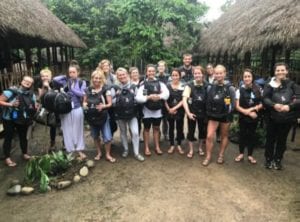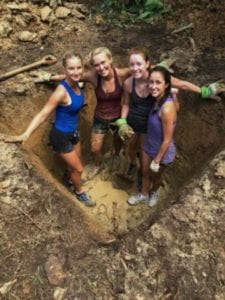Ursulines in Thailand: Santiwana Eco-Community
Sixty years ago, the Ursulines in Thailand bought 5 hectares [about 12 acres] of land 20 miles from the city center of Bangkok to use for education ministry. The land is lower than the surrounding area and floods at least two months every year in the rainy season.
About 35 years later, the Ursulines and Jesuits developed it as a retreat center for youth and city people who seek a place for quiet and solitude and named it “Santiwana,” which translates to “peaceful wood.”
Two years ago, the center director, Jesuit Fr. Vichai Phoktavi, became ill. Trying to find a way to make the empty center useful, we considered several questions: How does this relate to the needs of the next generation, particularly city people? How should we care for our common home, in the spirit of “Laudato Si’: on Care of our Common Home?”
We found a nongovernmental organization, Media Center for Development Foundation, with agricultural expertise, and using our land and their knowledge, we developed the place into an eco-community. The vision of this project is: “Living in harmony with nature in sustainable community with a spirit of love, sharing and sacrifice for our common home.” Its mission is to:
· Restore and maintain the integrity of the ecosystem there, including soil, water and biodiversity of plants and trees, small and large animals like birds, insects, butterflies and fish;
· Create habitats and produce food, medicine and clothing by planting rice, vegetables, herbs, fruits, mushrooms; raising ducks, chickens, goats, and fish; and processing and preserving food for consumption and sharing with the needy;
· Use innovative technology that is safe and friendly to people and the environment to produce compost, manure, earthworm fertilizer, charcoal and bioactivated carbon for agriculture, and use wind and solar cells to generate electricity in the community;
· Build a learning center to provide young people with ecological experiences: for example, the use of a solar pump or bicycle pump for watering; building a mud house, straw house, bamboo house, and a house from waste materials such as glass bottles, logs, or recycled paper; and
· Organize educational activities like lectures and workshops, an eco-camp and short courses in organic agriculture, food processing and natural product processing, alternative energy and waste management.
We hope this project will be an instrument of God, helpful to the environment by raising awareness and concern about waste and pollution for city people, especially the young. The Santiwana eco-community was begun last year. Though we have few younger sisters, we are confident that with networking, we can do something for our mother Earth, our common home.
The Ursuline Generalate in Rome:
International Center of the Ursuline Sisters of the Roman Union
Sr. Martha Counihan, in her book, Jetta’s Story, writes about 17 year old Jetta who with her seven year old sister came to live at the Generalate until the war ended in 1944.
Mother Magdalen Bellasis, then superior of the Generalate Ursuline community, welcomed Jetta and told her that the Sisters were already sheltering several Jewish families and Italian anti-fascists. An underground of women and men religious in Rome collaborated in sheltering thousands of hunted men, women, and children.
Mother Magdalen’s diary of the war years describes in detail the privations that the war caused to the Ursulines and their hidden “guests” – bombing, hunger, “visits” of police, thefts, curfews, blackouts, etc.
Jetta’s Story was published in 2017 using the diaries and archives at the Generalate and interviews with Jetta herself who has never forgotten her “mothers.”
Today
In the fall of 2015 as refugees were flooding Europe, Pope Francis encouraged all parishes as well as religious houses to welcome refugees. Once again, the Ursulines at the Generalate responded. Presently, the Ursulines have an agreement to welcome refugee women long-term at the Generalate (1 year or more if needed). Another agreement with the Rome-based Community of Saint Egidio is in place to welcome the refugee families short-term (1 week up to 2 months.)
Sr. Maria Jose, from the Generalate community reflects that the Sisters have tried to find a balance between being available to help their guests and leaving them the space to grow and to have their own privacy. She shares: “At first the Sisters had a bit of fear related to respect for their privacy. All worked together to develop shared rules. All the fear went away, and the reality was far better than we had expected. We have shared daily life with great simplicity, and the community has had the opportunity to welcome refugees while sharing dinner or lunch, washing clothes, in the garden or a ‘good morning.’ Life has been simpler than all the fears.”
The refugees share: “I was truly welcomed by the Sisters. Sr. Maria Jose always called to see how I was feeling.” “Thanks to the year I lived with the Sisters, I managed to save some money to rent a house on my own where I still live.”
London-Based Students Reach Out to New Orleans
Since 2010, an annual group of British Ursuline students has made the long trek to New Orleans help rebuild houses sponsored by the local Ursuline Sisters through their partnership with the St. Bernard Project (now called SBP). Founded in 2006 to help residents uprooted by Hurricane Katrina return to their homes, SBP is now active in six states and has brought home more than 1,500 families impacted by natural disasters, including the 2011 tornado in Joplin, Missouri.
“Once we build a house, it’s more than just 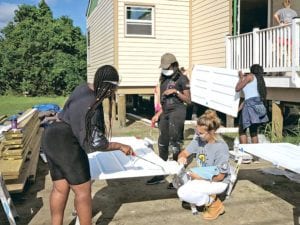 putting a roof over someone’s head. We come as compassionate people. We come to serve. We come to give them encouragement,” said Ursuline Sister Regina Marie Fronmuller, the New Orleans-based woman religious who spearheaded the Ursuline-SBP partnership in 2008. With elbow grease and donations from Ursulines’ global network of alumnae and friends, the Ursuline Sisters have sponsored five SBP houses to date in the Upper 9th Ward, Lower 9th Ward and New Orleans East.
putting a roof over someone’s head. We come as compassionate people. We come to serve. We come to give them encouragement,” said Ursuline Sister Regina Marie Fronmuller, the New Orleans-based woman religious who spearheaded the Ursuline-SBP partnership in 2008. With elbow grease and donations from Ursulines’ global network of alumnae and friends, the Ursuline Sisters have sponsored five SBP houses to date in the Upper 9th Ward, Lower 9th Ward and New Orleans East.
Last month’s teenage crew from London 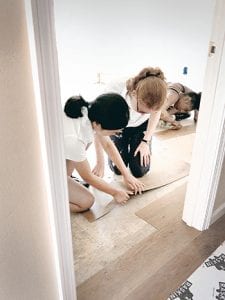 arrived to a nearly completed house, taking on finishing touches such as exterior painting, caulking and the installation of molding, doors and flooring. Incredibly, more than 13 years after Katrina, some parts of the Lower 9th Ward are still “jack-o’lanterned” – a random patchwork of new builds, dilapidated houses and prairie-like spaces exploding with goldenrod and debris.
arrived to a nearly completed house, taking on finishing touches such as exterior painting, caulking and the installation of molding, doors and flooring. Incredibly, more than 13 years after Katrina, some parts of the Lower 9th Ward are still “jack-o’lanterned” – a random patchwork of new builds, dilapidated houses and prairie-like spaces exploding with goldenrod and debris.
Ruby June Powell, a student at Ursuline High School in tennis-famous Wimbledon, said her New Orleans-forged skills include getting over her fear of climbing ladders and learning how to install baseboards.
“It’s a bit like puzzle working,” observed 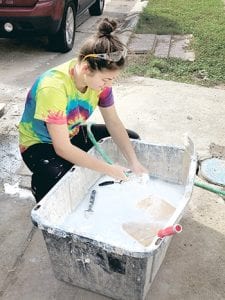 Powell, 17, of carpentry work. “What is really challenging is to make sure you’re getting the right angles, the right lengths. One centimeter can ruin the whole thing and you have to start over.”
Powell, 17, of carpentry work. “What is really challenging is to make sure you’re getting the right angles, the right lengths. One centimeter can ruin the whole thing and you have to start over.”
Powell said she was bowled over by the friendliness of strangers on her first big trip across the pond.
The Anglo-American collaboration took off in 2010, when Sister Regina Marie reached out to Sister Kathleen Colmer, the provincial of the London-area Ursulines, to propose an annual “service exchange” in which British Ursuline students in the sixth form (the British equivalent of American high school seniors) would come to New Orleans to work on houses, and groups of American Ursuline alumnae would volunteer at soup kitchens and homeless shelters in the U.K.
“We are united through our motto of Serviam – ‘I will serve,’” Sister Regina Marie said. “We Ursulines are global. We are one. We arrived (in New Orleans) in 1727, and there’s still that friendliness, that following in the steps of St. Angela, that stronger need to serve than to be served,” she said.
“I tell the students who come here, ‘You are full of vim, vigor and vitality!’” Sister Regina Marie said. “The mere fact of their youth, their happiness, their joy – energizes the homeowners. If it wasn’t for volunteers, our homeowners would never come home.”
Story and photos courtesy of the Clarion Herald, the official newspaper of the Archdiocese of New Orleans.

